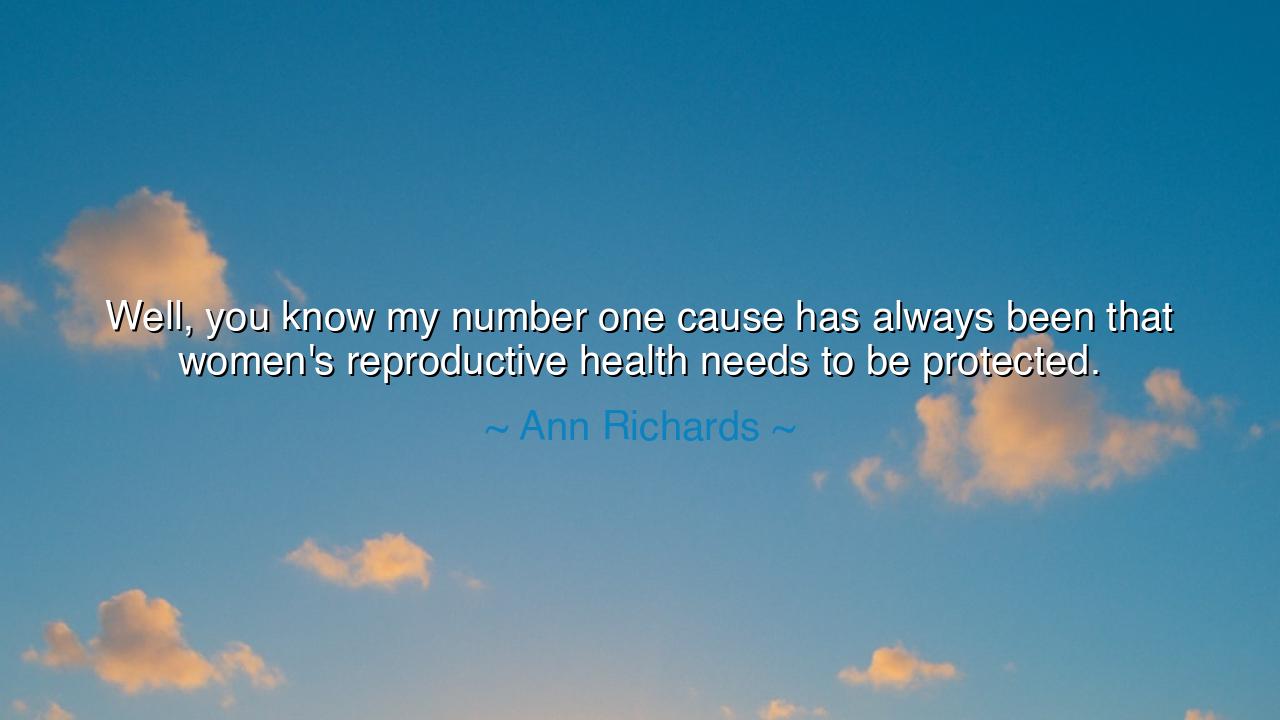
Well, you know my number one cause has always been that women's
Well, you know my number one cause has always been that women's reproductive health needs to be protected.






The indomitable Ann Richards, former Governor of Texas and champion of justice, once declared with unwavering conviction: “Well, you know my number one cause has always been that women’s reproductive health needs to be protected.” Her words, though simple, rise like a trumpet’s call—a declaration not merely of policy, but of principle, of compassion, and of the sacred right of autonomy. Richards was no stranger to the storms of politics, yet her heart remained anchored in the defense of the vulnerable. In this statement, she speaks not just for women, but for all humanity, reminding the world that to protect women’s health is to safeguard the very fabric of life itself.
To understand her words, one must first see the spirit from which they were born. Ann Richards was a woman forged in the fire of adversity—a teacher, a mother, a public servant, and a pioneer who rose in an age when the voices of women were still muffled beneath the weight of expectation. Her devotion to women’s reproductive rights was not born of ideology, but of empathy. She knew that the ability to make choices over one’s body is the foundation of freedom, that without control over her own health, a woman’s liberty is only an illusion. In defending these rights, she stood against centuries of silence, declaring that dignity begins where fear ends, and that health is not a privilege, but a human right.
The origin of her cause lay in the long and painful history of struggle that preceded her. For generations, women suffered in secrecy—denied access to care, condemned for their choices, forced into the shadows by shame and ignorance. In the early decades of the twentieth century, pioneers like Margaret Sanger risked imprisonment to advocate for contraception and education, believing that knowledge itself was liberation. Later, the landmark decision of Roe v. Wade in 1973 affirmed what Richards and countless others knew in their hearts: that a woman’s health, her body, and her destiny belong to no one but herself. When Richards spoke of protection, she spoke as a guardian of this hard-won freedom, aware that rights, once gained, must be eternally defended.
Her words echo the ancient truth that societies are judged not by their power, but by how they care for those who bear the next generation. In every age, women have been the givers of life, yet too often, their own well-being has been neglected, their suffering dismissed. Richards understood that to invest in women’s health is to invest in the health of the world. She saw that when women have access to care—when they are free from fear, empowered with knowledge, and treated with respect—families flourish, communities thrive, and nations grow stronger. To deny such care, she warned, is not only cruel, but self-destructive; for when the life-giver is weakened, so too is the life she nurtures.
History offers many examples of this truth. Consider Dr. Elizabeth Blackwell, the first woman physician in the United States, who opened clinics for impoverished mothers and children in the nineteenth century. She faced ridicule and exclusion from her male peers, yet she persevered, declaring that women’s health must be treated with the same seriousness as men’s. Like Ann Richards, she understood that compassion requires courage—that progress demands both vision and defiance. Their struggles, separated by generations, were part of the same continuum of care, stretching from the first midwife of ancient times to every doctor, nurse, and advocate fighting today to preserve what was so painfully earned.
The lesson, then, is both eternal and urgent: that the defense of women’s reproductive health is not a partisan issue, but a moral one. To protect women’s right to choose, to heal, to thrive, is to uphold the dignity of all humanity. Every citizen, man or woman, must see this not as the fight of one gender, but as the fight for justice itself. Health is the soil from which liberty grows, and when that soil is poisoned by inequality, fear, or neglect, the tree of freedom cannot flourish. Let no one be deceived: when women’s rights are diminished, the light of civilization itself begins to dim.
So, children of the modern world, remember the wisdom of Ann Richards. Defend what is right not only with your words, but with your actions. Support access to care for those who cannot afford it; speak for those whose voices are ignored; educate, nurture, and protect. Let your compassion be louder than the clamor of ignorance. For as Richards knew, the cause of women’s health is the cause of life itself, and to guard it is to stand as a sentinel for the generations yet to come. And when you are asked, as she once was, what your number one cause may be—may your answer, too, be spoken with the same courage, clarity, and love.






AAdministratorAdministrator
Welcome, honored guests. Please leave a comment, we will respond soon